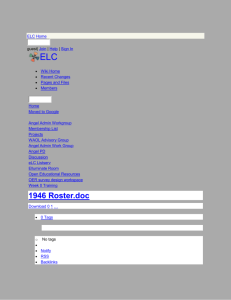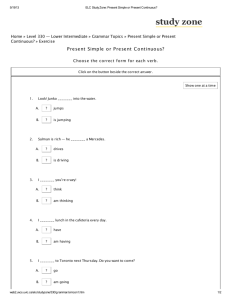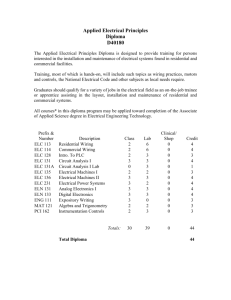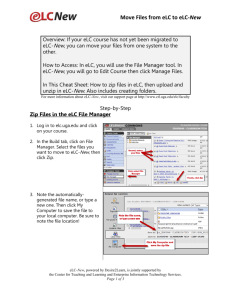GEOGRAPHY 1125 - UGA Office of Sustainability
advertisement
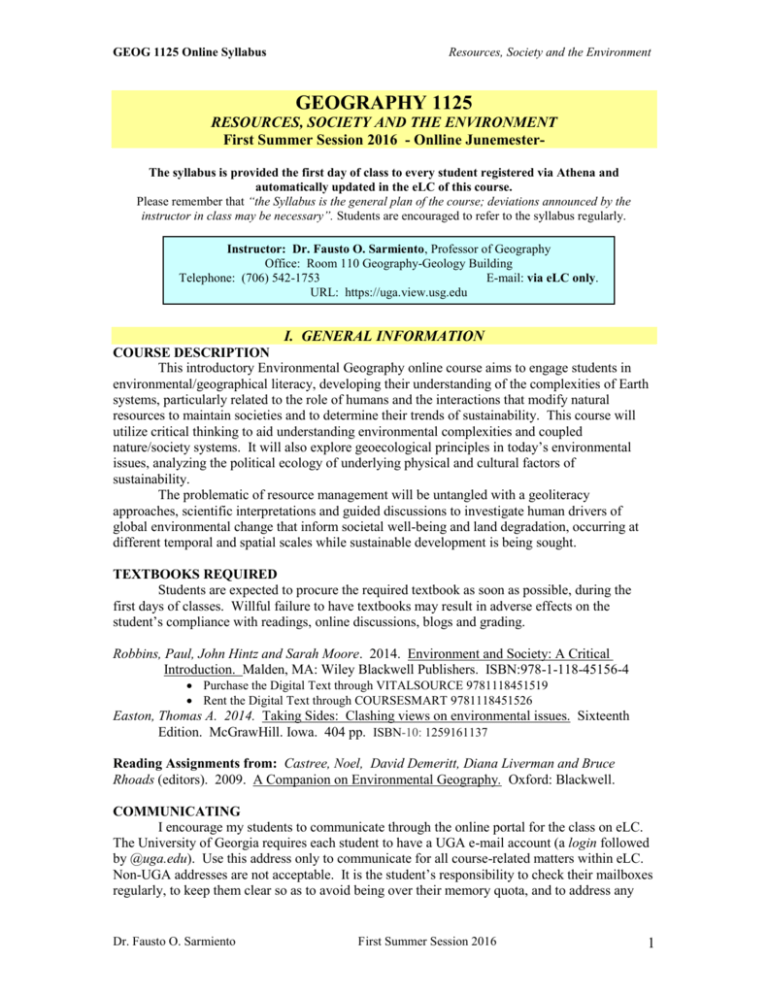
GEOG 1125 Online Syllabus Resources, Society and the Environment GEOGRAPHY 1125 RESOURCES, SOCIETY AND THE ENVIRONMENT First Summer Session 2016 - Onlline JunemesterThe syllabus is provided the first day of class to every student registered via Athena and automatically updated in the eLC of this course. Please remember that “the Syllabus is the general plan of the course; deviations announced by the instructor in class may be necessary”. Students are encouraged to refer to the syllabus regularly. Instructor: Dr. Fausto O. Sarmiento, Professor of Geography Office: Room 110 Geography-Geology Building Telephone: (706) 542-1753 E-mail: via eLC only. URL: https://uga.view.usg.edu I. GENERAL INFORMATION COURSE DESCRIPTION This introductory Environmental Geography online course aims to engage students in environmental/geographical literacy, developing their understanding of the complexities of Earth systems, particularly related to the role of humans and the interactions that modify natural resources to maintain societies and to determine their trends of sustainability. This course will utilize critical thinking to aid understanding environmental complexities and coupled nature/society systems. It will also explore geoecological principles in today’s environmental issues, analyzing the political ecology of underlying physical and cultural factors of sustainability. The problematic of resource management will be untangled with a geoliteracy approaches, scientific interpretations and guided discussions to investigate human drivers of global environmental change that inform societal well-being and land degradation, occurring at different temporal and spatial scales while sustainable development is being sought. TEXTBOOKS REQUIRED Students are expected to procure the required textbook as soon as possible, during the first days of classes. Willful failure to have textbooks may result in adverse effects on the student’s compliance with readings, online discussions, blogs and grading. Robbins, Paul, John Hintz and Sarah Moore. 2014. Environment and Society: A Critical Introduction. Malden, MA: Wiley Blackwell Publishers. ISBN:978-1-118-45156-4 Purchase the Digital Text through VITALSOURCE 9781118451519 Rent the Digital Text through COURSESMART 9781118451526 Easton, Thomas A. 2014. Taking Sides: Clashing views on environmental issues. Sixteenth Edition. McGrawHill. Iowa. 404 pp. ISBN-10: 1259161137 Reading Assignments from: Castree, Noel, David Demeritt, Diana Liverman and Bruce Rhoads (editors). 2009. A Companion on Environmental Geography. Oxford: Blackwell. COMMUNICATING I encourage my students to communicate through the online portal for the class on eLC. The University of Georgia requires each student to have a UGA e-mail account (a login followed by @uga.edu). Use this address only to communicate for all course-related matters within eLC. Non-UGA addresses are not acceptable. It is the student’s responsibility to check their mailboxes regularly, to keep them clear so as to avoid being over their memory quota, and to address any Dr. Fausto O. Sarmiento First Summer Session 2016 1 GEOG 1125 Online Syllabus Resources, Society and the Environment other e-mail account problems promptly. All e-communication will be done via eLC. Any email correspondence not coming through this way (e.g., directly sent to my UGA arches account) will not be answered, since filters take those directly to the Junk mail folder. Messages without formal salutation or with non-courteous contents will be disregarded and dismissed. The eLC will house all materials online, including syllabus, rubric, handouts, presentations or PDFs for reading assignments; homework and other relevant information will also be posted. Communication within eLC is one click away! II. GRADING POLICY AND EXAMS I grade all assigned coursework on the basis of 100. Calculated grades are computed to the nearest hundredth of a point (.01), except for the grade to the entire course, which is rounded to the nearest whole number. If a grade computes for example to 89.4, it will be rounded down to 89/100 and reported as a “B+”; if it computes to 89.5, it will be rounded up to 90/100 and reported as an “A-”. Unless a factual error of computing can be demonstrated, I do not change a grade once it has been assigned. Grades will be posted on eLC as they become available, so students will always be able to see where they stand grade-wise. However, this is only an indication of how the student is performing in the course at that particular point of the semester; it does not, in any way, constitute on my part a promise, much less a guarantee, that the grade for the entire course will be the same, or even comparable. FINAL GRADE 100 – 95 94-90 89-87 86-84 83-80 79-77 76-74 73-70 69-60 < 60 LETTER GRADE A AB+ B BC+ C CD F Combining periodic quizzes, midterm and final exam, portfolio, class participation and attendance will assess grades in the course, as follows: Student blog entries ……….…….………………… 20% Midterm exam …….……………………………….. 20% Final exam ………………………………………… 20% Environmental footprint assessment …..…...……. 20% Weekly reader research portfolio………………….20% TOTAL …………………...………………………. 100% Student blog entries Active participation in the student blog, worth 20% of the grade, is expected from each student with thoughtful contributions to debate and to generate further inquiries on contrasting views in relation to specific environmental issues, selected from the list provided in the syllabus as per the Easton’s textbook. Dr. Fausto O. Sarmiento First Summer Session 2016 2 GEOG 1125 Online Syllabus Resources, Society and the Environment Midterm exam: A comprehensive first halfway evaluation of the theory presented up to the midpoint of the semester, worth 20% of the total grade of the course. It will be a closed book, 40 minutes test, including sections for a brief essay or short answer questions; it will be given during a normal class period. No make up exam will be given for any reason. Pencil #2 and eraser needed. Final exam: A comprehensive second halfway evaluation of the theory and practice dealt with during the course, worth 20% of the total grade. It will be a closed book, three-hour session during the week of finals, according to university scheduling. No make up exam will be given for any reason. Pencil #2 and eraser needed. Environmental footprint assessment: A term paper consisting of up to 5 pages, arranged as instructed in eLC, with original work on a personal topic with debatable questions, worth 20% of the final grade. The term paper will introduce students to scientific writing styles and research methodologies on environmental issues. A clean, printed, and proof-edited copy will be furnished in the final day of class. Weekly reader Research Portfolio: A novel collection of environmental ideas, terms or processes is to be created with weekly readers, and will be based on students’ discussion and class debate written as one-pager homework reactions to environmental reader topics, that will count as participation grade, worth 20% of the grade. Each assigned one-pager will be turned in to build the environmental portfolio and glossary with those installments III. CLASSROOM CONDUCT AND ACADEMIC HONESTY Students are responsible for conduct themselves according to the policies outlined in the Scholastic Dishonesty Code. Academic misconduct, including plagiarism, unauthorized assistance, lying, tampering, bribery, copying others’ tests, theft or sabotaging others’ work, shall not be tolerated. For further details, please visit the Office of Vice President for Instruction webpage: http://honesty.uga.edu/ahpd/culture_honesty.htm The instructor prosecutes all instances of academic dishonesty. UGA closing: in the rare event of the University closing due to a weather advisory and other unexpected events, all tests and homework will be due the class immediately following the school’s reopening. IV. LECTURE OUTLINE AND READING SCHEDULE (available at the eLC’s course contents page as ‘itinerary’) Note: changes or deviations to the syllabus may be necessary without prior notice THEMES FOR CLASS EXPOSÉ: Every issue will be assigned to students for review of an environmental issue from Easton’s book. Each student will manage a blog on the topic and will coordinate discussion of such contentious issue, including introductory/historical/conceptual frameworks, positive arguments, negative arguments, and concluding caveats or codas. Exposé grading will reflect preparation and practice; a powerpoint or Prezzy will be requested for eLC posting and your oral presentation will be deemed as professional. Both, the preparation and the delivery, will constitute the grade. Part 1: Environmental Philosophy Dr. Fausto O. Sarmiento First Summer Session 2016 3 GEOG 1125 Online Syllabus Resources, Society and the Environment Issue 1: Is the Precautionary Principle a sound approach to risk analysis? Issue 2: Is Sustainable Development compatible with human welfare? Issue 3: Should a price be put on Environmental Goods and Services in the world? Part 2: Principles versus Politics Issue 4: Should North American landscapes be restored to its pre-human state? Issue 5: Should the military be exempt from environmental regulations? Issue 6: Will restricting Carbon emissions damage the US economy? Part 3: Energy Issues Issue 7: Should we drill for off-shore oil? Issue 8: Is Carbon capture technology ready to limit Carbon emissions? Issue 9: Is it time to put geothermal energy development in the fast track? Issue 10: Should cars be more efficient? Issue 11: Are biofuels responsible for rising food prices? Issue 12: Is it time to revive Nuclear Power? Part 4: Food and Population Issue 13: Are improved aid policies the best way to improve global food supply and protect world population? Issue 14: Is Genetic Engineering the answer to global hunger? Issue 15: Can Organic Farming feed the world? Part 5: Toxic chemicals Issue 16: Should DDT be banned worldwide? Issue 17: Do Environmental Hormone Mimics pose a potentially serious health threat? Issue 18: Is the Superfund program successfully protecting human health from Hazardous Materials? Issue 19: Should the USA reprocess spent nuclear fuel? Issue 20: Does commercial fishing have a future? Issue 21: Is global warming a catastrophe that warrants immediate action? Part 6: Wrapping up the environmental take home message Issue 22: How to make a better world probable. Rescuing a planet under stress and a civilization in trouble. CO-CURRICULAR ACTIVITIES It is highly encouraged to actively participate in campus life related to environmental awareness, coal-free campus, nature protection, social justice, hunger relief, (anti)war or other form of peaceful activism. For each of such activities, a one-page report with the critique of the event will be graded to One Point Extra Credit. A total of Five Extra Credit can be earned towards the final grade. EXTRA-CURRICULAR ACTIVITIES A selected list of environmental literature is available for students to read and prepare a review with the style of book reviews presented in geographical scientific literature. To use other readings, previous authorization should be obtained from the professor. Each report will be worth two points of extra credit. A total of Five Extra Credit can be earned towards the final grade. Dr. Fausto O. Sarmiento First Summer Session 2016 4
